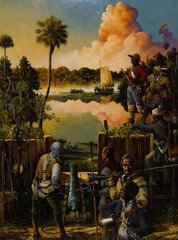The Amelia Expedition: Louis Aury, Filibustering, and the Politics of
Primitive Accumulation
William Armshaw
Draft Copy – Do Not Circulate
or Cite Without Permission
Introduction:
The Republic of the Floridas, September 1817
It was late September when
the banner of the insurgent Mexican Republic was first hoisted, attended by the
boom of cannon and the polyglot roar of the assembled ranks, above the streets
and quays of the Spanish island port of Fernandina, just south of the Georgia
border. In that year 1817, “first of the
Independence of the Floridas,” Louis-Michel Aury, once Commodore of the
revolutionary Republic of New Grenada, now captain of a crew of several hundred
Haitian, Irish, French and American sailors and soldiers, proclaimed the
foundation of the Républica de las
Floridas. The Proclamation of this revolutionary
polity began with an epitaph taken from Cicero, words written in the shadow of
the fall of the Roman Republic:
What will happen I
certainly do not know but nevertheless there is one hope that some day the
Roman people will be like our ancestors.
I at least shall not fail the Republic and whatever happens I hope that
I shall be free from all blame in this matter and that I shall bear it with a
brave heart.[1]
[1] Report
of the Committee – Appointed to Frame the Plan of Provisional Government for
the Republic of the Floridas by Pedro Gaul, Chairman, Vicente Pazos, and M.
Murden, December 9, 1817. George R.
Fairbanks Collection, Reel 8, no. 61, Robert Strozier Library Special
Collections, Florida State University.
[2] John Houston McIntosh to Treasury Secretary
William Crawford, July 30, 1817, American State Papers Class I: Foreign
Relations, vol. 4, p. 128. This
quotation, perhaps the most reproduced of any of the remarkable
characterizations of the pirate polity on Amelia Island, has been extensively
cited; see Jane Landers, Black Society in Spanish Florida, 246, Owsley
and Smith, Filibusters and Expansionists, 118 and T. Frederick Davis,
“MacGregor’s Invasion of Florida, 1817; together with an account of his
successors, Irwin, Hubbard and Aury on Amelia Island, East Florida” (Florida
Historical Society, 1928), 39.
